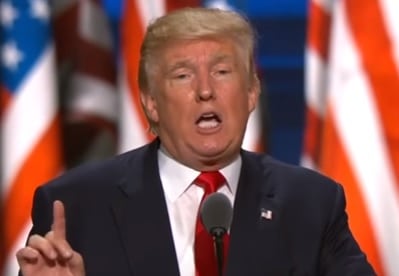
Republican presidential nominee Donald Trump has throughout his campaign has had strong words about U.S. involvement in United Nations climate initiatives. Those words, according to Patrick Michaels, director of the Center for the Study of Science at the Cato Institute, are backed up by the Republican Party’s 2016 platform. However, that opposition may not mean much to the U.N.
The United States officially joined the Paris Agreement in early September. The agreement, which will enter into force Friday, establishes a legally binding framework requiring parties to make commitments to address climate change and to report their progress to the United Nations Framework Convention on Climate Change. The commitments themselves, however, are not legally binding.
The Republican Party’s platform makes clear that a GOP administration would not support U.S. participation in the agreement. “We reject the agendas of both the Kyoto Protocol and the Paris Agreement, which represent only the personal commitments of their signatories; no such agreement can be binding upon the United States until it is submitted to and ratified by the Senate,” the platform says.
The platform has a simple translation, according to Michaels. “[The] Republican platform, and presumably the Trump administration, would treat Paris as an agreement signed between President [Barack] Obama and the United Nations, and because President Obama will no longer be on the scene, it will say it is null and void,” he said Tuesday at an event hosted by the Environmental Law Institute.
Trump has pledged to “cancel” the agreement, an action that will become markedly more difficult after Friday. Once the accord enters into force, no party may exit the agreement for four years. However, Trump could very well just decide not to work toward meeting the U.S. pledge to reduce greenhouse gas emissions 26-28 percent by 2025.
The presidential nominee also vowed on Monday during a campaign stop in Grand Rapids, Mich., to halt U.S. funding to United Nation climate change programs, presumably alluding to the Green Climate Fund, which supports climate change action in developing nations. “We don’t have to give hundreds of billions of dollars away to people who are probably laughing at us,” Trump said. The actual pledged U.S. contribution to the Green Climate Fund is much less than “hundreds of billions.” The nation is committed to providing just $3 billion to the fund, $500 million which has already been paid.
Even if Trump ignores the U.S. commitment under the Paris Agreement, the United States will remain a party to the agreement, regardless of the Republican Party’s belief that the nation has not joined in a valid fashion.
John Pendergrass, vice president of programs and publications at the Environmental Law Institute, noted that the United Nations did not require domestic ratification per se for inclusion in the agreement. “The agreement provided for multiple methods of countries ratifying, and the U.S. used one of those methods the agreement provides for. So, according to the agreement, the U.S. has ratified,” Pendergrass said.
Nations must present to the U.N. instruments of ratification, acceptance, approval, or accession to formally join the agreement. The U.S. deposited an instrument of acceptance on Sept. 3 and is thus considered by the U.N. to be a member of the agreement. Currently, 92 nations have ratified the agreement.
Had the U.S. been required to ratify the agreement, the Obama administration would have needed to wrangle a two-thirds vote in the Republican-controlled Senate. The State Department said that because the domestic commitments in the accord are not legally binding, ratification by the Senate is not necessary. Not surprisingly, Republicans do not agree, Michaels said.